News & Events in Belarus
Independence Day, SCO membership, marathon of negotiations, and fern flower in President’s Week
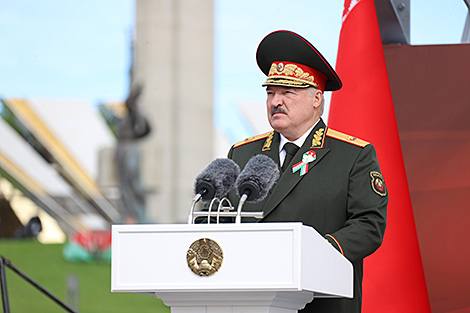
The work schedule of the Belarus president is always full of events. Aleksandr Lukashenko holds conferences and working meetings on the most topical matters concerning the country’s development, regularly visits the regions, goes on foreign trips and welcomes foreign guests, talks to reporters, signs decrees and laws. And even if there are no public events, it does not mean that the head of state does not work. It must be said that even when he relaxes, for instance, by playing ice hockey or chopping firewood, Aleksandr Lukashenko happens to find the time to give yet another instruction. All the decisions must be prompted by life, he likes to say.
The President’s Week project is intended for those, who want to keep up with the head of state, be up-to-date on the latest statements and decisions of the Belarusian leader.
Past week Aleksandr Lukashenko celebrated Independence Day as well as the 80th anniversary of Belarus’ liberation from Nazi invaders with the entire country. A ceremony to present government awards to outstanding Belarusians, a solemn assembly at the Palace of the Republic, and a military parade – the president traditionally participated in all of these important and significant events.
Aleksandr Lukashenko talked a lot about history, about preserving memory about the heroic deeds of the ancestors. He named those, who are responsible for the genocide of the Belarusian nation and castigated those, who are trying to revive Nazism and organize a new “crusade”. He also said a lot about complications of the current international situation around Belarus, security challenges at the border, the reinforcement of the Belarusian army, and interaction with allies.
But after all, the most important thing the president wants people to embrace is peaceful and creative labor, friendship and trustful cooperation with other countries and international associations. Belarus is still open to cooperation even with the West, which continues pursuing a militaristic and sanctions-based policy. Belarus advocates humanism and has no intention of getting involved in any combat operations. It must be said that this stance will not prevent the country from defending itself if need be without drawing any red lines.
By the way, this humanistic approach was manifested in practice as the head of state signed an amnesty law ahead of Independence Day: many convicts were given a second chance to live a normal life.
Belarus has many friends and partners it can rely on across the world. The Shanghai Cooperation Organization summit, which took place in Astana past week, testifies to it. During the summit Belarus became a full member of the Shanghai Cooperation Organization. According to the Belarusian leader, Belarus is very proud of it. Aleksandr Lukashenko identified the country’s key priorities in the organization, encouraged everyone to build Greater Eurasia, create foundations of genuine and indivisible international security, build up interaction in finance, and reduce dependence on the U.S. dollar.
And of course, a marathon of meetings and negotiations on the sidelines of the summit took place in Astana where leaders of more than 15 countries and heads of major international organizations were present.
The Belarusian-Russian agenda was noticeable past week. In the run-up to Independence Day Aleksandr Lukashenko received a report from Head of the Belarus President Administration Dmitry Krutoi and Ambassador of Belarus to Russia Aleksandr Rogozhnik. The president gave instructions to continue strengthening positions on the Russian market. The head of state welcomed Chairman of the State Duma of the Federal Assembly of the Russian Federation Vyacheslav Volodin in the Palace of Independence on the same day. The MP led the Russian delegation to celebrations in Minsk.
Aleksandr Lukashenko spent the end of the week in his hometown area where the Kupala Night Festival (Alexandria Gathers Friends) gathered multiple guests on the bank of the Dnieper River for the 15th time already. The president underlined the importance of preserving and developing the native culture. He described it as the cornerstone of Belarusian statehood. And it seems that Belarusians have found their own lucky fern flower.
But the beginning of the week started with sad news: Hero of Belarus, Honored Worker of Agriculture, Chairman of the Board of the agricultural enterprise SPK Progress-Vertelishki Vasily Revyako died. Aleksandr Lukashenko sent condolences to the family and friends of this prominent statesman.
HISTORY OF WINNERS. What did Aleksandr Lukashenko talk about during the army parade on Independence Day?
There is no doubt that Independence Day was this week’s key event inside the country. This year’s celebration of Independence Day was particularly massive considering the 80th anniversary of Belarus’ liberation from Nazi invaders.
Aleksandr Lukashenko congratulated fellow Belarusians on the occasion. “With its greatness and spiritual power this holiday has tied together the continuity of many centuries of traditions, military and labor valor, and contemporary accomplishments of our nation,” the Belarusian leader stressed. “We boldly look into tomorrow and will do everything to make descendants proud of us just like we are proud of generations of Belarusians, who did not spare their lives and rose up to defend the Fatherland. They selflessly worked and believed in a happy future of their kids and grandkids.”
Aleksandr Lukashenko and the Belarusian nation received multiple congratulations on the occasion of Independence Day from foreign leaders, who wished peace, prosperity, and wellbeing. By the way, a Russian government delegation led by Chairman of the State Duma of the Federal Assembly of the Russian Federation Vyacheslav Volodin came to Belarus upon Vladimir Putin’s instructions to participate in Independence Day celebrations. Aleksandr Lukashenko had a separate meeting with him.
Large-scale celebrations took place in the capital city and in the regions. The army parade in Minsk in the morning on 3 July was one of the top events. The Belarus president was traditionally present during the parade.
A total of over 5,000 military personnel took part in the parade. The parade also featured over 300 units of modern wheeled and tracked vehicles as part of the mechanized column.
Pilots also demonstrated impressive performance. As many as 47 modern units of Belarus’ and Russia’s air forces demonstrated aerobatic maneuvers above the capital city. The honor guard company performed an exhibition drill in addition to the main event. A new program was prepared in honor of the 80th anniversary of Belarus’ liberation from Nazi invaders and was met with thunderous applause.
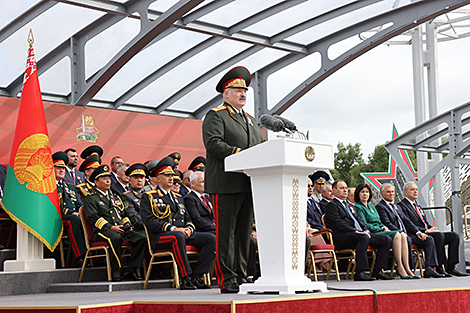
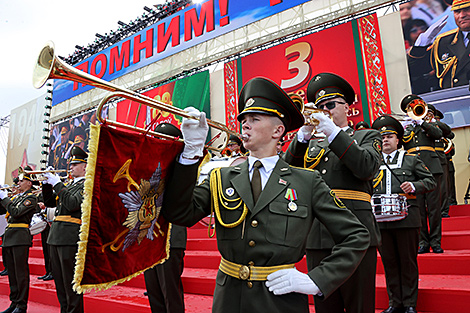
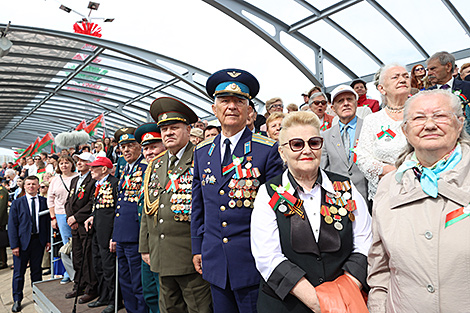
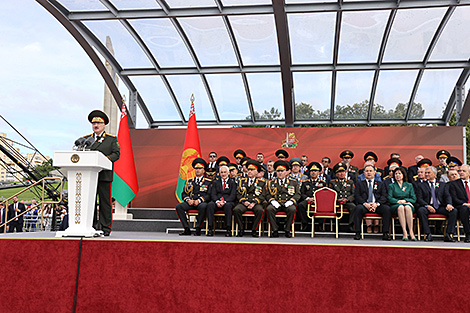
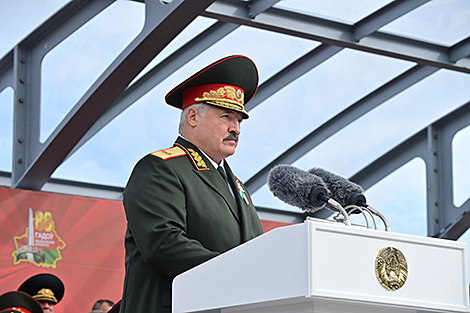
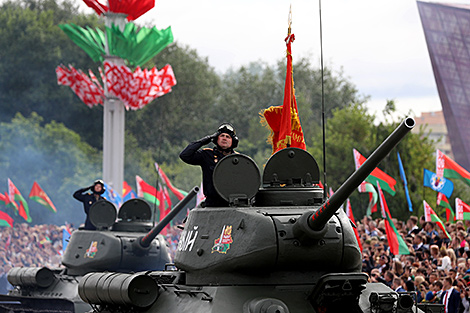
The parade was followed by theatricalized illustrations of the 80 years since the victory. Essentially they retold the story of Belarus after the war and at present. The premiere of the song 80 Victorious Years was the final part of the theatricalized episode.
Historic memory
In his speech during the parade Aleksandr Lukashenko reminded with what Great Patriotic War events Belarus’ key state holiday is connected and why it is necessary to carry memory about the heroic deed of the ancestors through generations. “Those volleys still echo in our historic memory. And we know that we should do everything to carry this memory through centuries,” Aleksandr Lukashenko stated.
“It is full of pain and suffering, patience and courage, heroic deeds, and the triumph of justice. It contains hundreds of thousands of names of heroes. It contains the strength of the nation of descendants of the winners,” he said. “The future of many nations was decided in the Belarusian land back then. Fascists, who had been recruited from entire Europe, and warriors of the great multiethnic Red Army, clashed in that fateful battle. Head-on. It was a battle for freedom and the future of our nation, for freedom and the future of the nations of the entire continent. It was a confident step towards the Great Victory.”
Aleksandr Lukashenko described the strategic offensive operation Bagration, which resulted in the liberation of the capital city and entire Belarus, as an example of high military art and one of the most heroic pages of the Great Patriotic War.
Allies in the same ranks
Military personnel representing the armies of Azerbaijan, Kazakhstan, China, Kyrgyzstan, the Russian Federation, Tajikistan, and Uzbekistan took part in the parade in Pobeditelei Avenue.
“We will march together because we have learned the key lesson of the Great Patriotic War: Nazism is absolute evil. There are no and there can be no justification and forgiveness for Nazi crimes. Neither back then nor now nor in the future. We say it to those who sow discord, those who plant seeds of discord in our lands, those who are ready to pull their nations into a new bloodbath,” the president stressed.
Aleksandr Lukashenko noted that the parade in Minsk was a sign of the strength of the allied strategic partnership of Belarus and Russia, of interaction with Collective Security Treaty Organization member states, of military cooperation with the People’s Republic of China. “It is a sign of our readiness to rise up as one today in order to defend historic memory, values, and our sovereignties. All of us are united by the Great Victory over the common enemy – countries of Hitler’s alliance. It teaches us to protect peace by any means of deterrence,” he said.
In his words, an inspection of the Belarusian-Russian joint regional military force, Belarus’ first practice drill for non-strategic nuclear forces has demonstrated that the level of the defensive capacity of the Union State of Belarus and Russia has never been higher.
“And it is the guarantee that our voice, the voice of allies and partners in favor of defending the multipolar and fair world, will be heard and our parade will pass into a peaceful future. It is our goal. Young people stand in ranks next to defenders of the Fatherland. Machines and equipment for a peaceful life stand next to military hardware. The winners bequeathed us to live and build a future for new generations. We will not fail them. We have no right to,” the Belarusian leader said.
Western “teachers”
Aleksandr Lukashenko noted that constant attempts to lecture Slavs about something had been made in various historical periods. Nazi Germany assumed the role of “the teacher” back then. Today the entire European Union led by the United States of America is trying to do the same.
“We know their real goals. We know who stands behind every provocation at Belarus’ state border, behind every terrorist threat to the peaceful population. We have never been more vigilant. We have learned all the lessons of the beginning of the Great Patriotic War. And we have only one teacher – our history. The history of winners,” Aleksandr Lukashenko stated.
Military might and peaceful goals
But Belarus pursues peaceful goals even in the course of demonstrating its military might. “In the name of peace we reinforce and develop the Armed Forces, perfecting the entire military organization of the state. Our nation needs to know and see that everything and even more than that is being done for the army as well as territorial defense forces and the people’s militia to be ready to defend the country. And you know they are ready,” Aleksandr Lukashenko stated. Belarus has state-of-the-art weapons and hardware. The country’s defense industry is actively developing. Domestic missile systems, small arms, artillery shells, unmanned aerial vehicles, communication and automatization solutions are being created. “The things a modern war needs,” the head of state noted.
“But as I’ve already said, people are our key strength. Soldiers and officers are heroes of the present age. They already demonstrate courage and strength of spirit. Our parade is recognition of the professionalism and dedication to duty of military personnel, border service personnel, fighters and officers of security agencies, which do everything to prevent provocations staged by unfriendly states from growing into a full-scale military conflict,” the Belarusian leader added.
Aleksandr Lukashenko made it clear that the current generation had been entrusted with the mission to preserve peace in the native land. The peace that grandfathers and great grandfathers gifted to Belarusians 80 years ago. “We should be worthy of their immortal deed,” the head of state encouraged.
HEROIC DEEDS IN TIME OF PEACE. Who did the president award?
Another beautiful tradition observed ahead of the key state holiday provides for not only recalling the heroic past but also awarding those, who work in this day and age to enhance the country’s prosperity, including by making sure that Belarusians continue to live in peace. Aleksandr Lukashenko presented government awards to outstanding citizens in the Palace of Independence on 2 July.
The president remarked that huge work to restore the liberated Belarusian capital city and later on the entire country began 80 years ago. “I am convinced that in July 1944 in their fairest dreams people already saw Belarus the way we can see it now. Independent, beautiful and most importantly peaceful.”
A lot of people in uniform were among those the president presented awards to. Those were representatives of the Armed Forces, state security agencies, internal affairs agencies, the border service, who defend peace and calm in Belarus with weapons in arms. “We saw it in 2020. Just like the mythic titan Atlas defense, security, and law enforcement officers keep the clear sky of our country on their shoulders. And they will keep doing it,” Aleksandr Lukashenko stated.
At the same time representatives of civilian professions should now work with full commitment and essentially according to wartime laws, the head of state is convinced. In his words, those, who turned up for the award ceremony in the Palace of Independence, have been working for years like that. The number included respected executives and administrators, who have dedicated themselves to complicated civil service, to ensuring constitutional legitimacy and the rule of the people, as well as heads of major enterprises and entire economy branches.
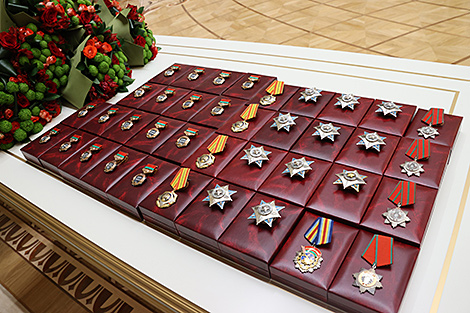
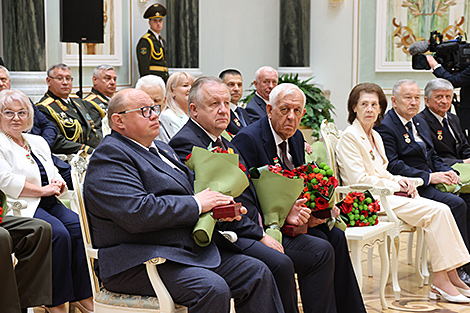
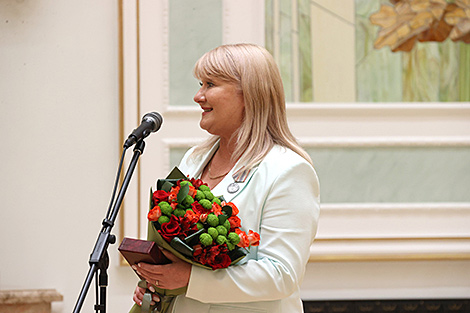
Workers of science and education were present during the ceremony: professors, scientists, inventors, teachers, who had raised winners of academic excellence competitions. All of them make a huge contribution to the country’s future, to the intellectual and technological future. The awardees also included agrarians, miners, construction workers, and transport industry professionals. The head of state had the kindest words to say to those, who take care of social work and community service, to those, who take care of the elderly, particularly those, who have survived the Great Patriotic War of 1941-1945.
Addressing all those present during the ceremony, the president stressed: “You are worthy successors of those, who defended our freedom and independence 80 years ago only to rebuild the ruins and expedite the country’s development ahead of projections. After gaining sovereignty we built a truly people’s state together. And nowadays however hard things may be, it is our turn to write new pages of Belarusian history. Bright, happy, and definitely peaceful ones. Time has chosen us.”
In conclusion of the ceremony Aleksandr Lukashenko pointed out that every awardee still has plenty of time to accomplish more labor deeds and military deeds. “But preferably in the time of peace,” the head of state pointed out. “We will do everything in order to keep peace and calm in Belarus.”
“You have done a lot to build our country. You and I have gone down this most difficult road together,” the president added. “We’ve done it. This is why we will also do what we are supposed to do: raise new young people to power, put them in positions of leadership so that they could continue the deeds we’ve started.”
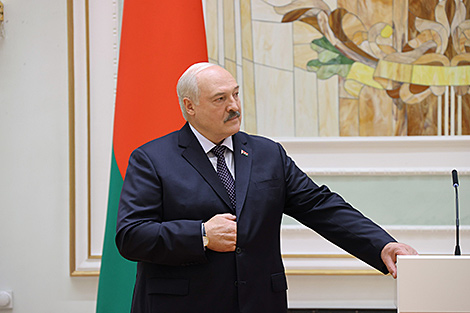
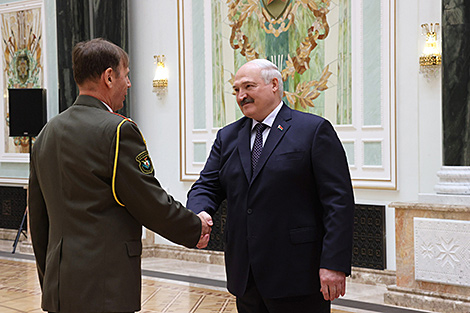
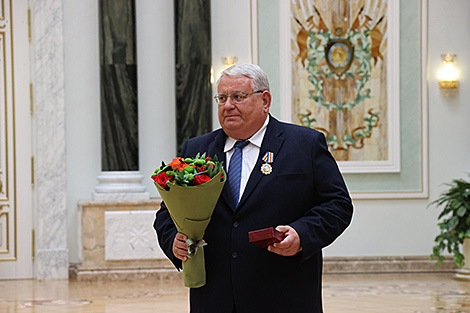
The head of state presented an Order of Fatherland, 2nd Class to Ambassador Extraordinary and Plenipotentiary of the Republic of Belarus to the Russian Federation (2018-2022) Vladimir Semashko. An Order of Fatherland, 3rd Class went to Head of the Belarus President Property Management Directorate Yuri Nazarov, Deputy Chairman of the Belarusian People’s Congress Aleksandr Kosinets, and Energy Minister Viktor Karankevich.
As he accepted the award, Aleksandr Kosinets thanked the head of state for the high evaluation of his work: “For nearly 30 years I’ve been working under the leadership of Aleksandr Grigoryevich [Lukashenko]. During these years I saw creation, creativity, development, innovation. The Belarusian nation built an independent and sovereign state under the leadership of our president.”
The president also presented an Order of Labor Glory to Mikhail Filimonov, Aide to the Director General of the state enterprise Belarusian Nuclear Power Plant for interaction with the state power engineering group Belenergo, the Energy Ministry, and other government agencies.
An Order for Service to the Homeland, 3rd Class was bestowed upon Chief of the 86th Border Group of the border service Maksim Butranets. Orders of Honor were bestowed upon Chairman of the Council of the Mogilev Oblast branch of the Belarusian Public Association of Veterans Anatoly Glaz, First Deputy Tax and Duties Minister Igor Klepcha, Director of ZAO Pinskdrev-Bobruisk Vladimir Markushevsky, and Chairman of the Belarusian Chamber of Commerce and Industry Mikhail Myatlikov.
A large group of representatives of various spheres of activity were awarded honorary titles.
PEOPLE BECAME NATION. How much did international legitimacy cost to Belarus?
A solemn assembly held in the Palace of the Republic ahead of Independence Day was another traditional event. The program always includes a festive concert but it is always preceded by the performance of the national anthem and a speech by the president.
This time Aleksandr Lukashenko delivered a speech that lasted for over 40 minutes. After the protocol part the head of state made a number of comments on hot-button topics that worry the general public such as the situation at the Belarusian-Ukrainian border, migration problems, and the exchange of prisoners of war with Ukraine.
You can find all the statements covered in detail on BelTA’s website. Here is a brief summary of the key points.
Ways towards independence and importance of the end result
The first part of Aleksandr Lukashenko’s speech was dedicated to historical memory, to the trials the Belarusian nation had to endure on the way towards its own independence. The fate of every citizen and the nation as a whole was at stake during the Great Patriotic War. The country’s independence would be impossible without it. As Belarusians mark yet another anniversary of the country’s liberation from Nazi invaders, in their thoughts they travel along the victory roads starting with the liberation of the town of Komarin and ending with heroic Brest Oblast. “It is our way, the way towards our independence,” Aleksandr Lukashenko stated. “This holiday and symbols of our country represent a tribute to the memory of the victorious Soviet nation, a tribute to the memory of Belarusians, who endured all the hardships of the terrible years of war.”
He noted that milestones of Belarus’ historical development are marked by the change of eras of great power and great shocks. “It is the historic path, on which our Belarusian nation matured, was tempered, and shaped its own national self-awareness,” the head of state stressed.
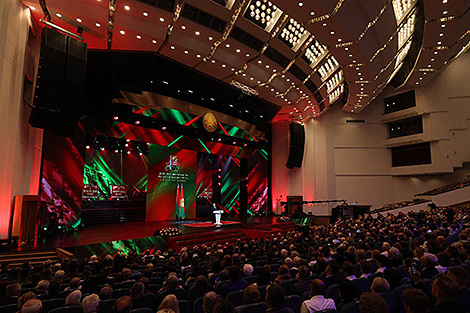
“We should stop all the debates about whether the local forms of statehood, which replaced each other, were Belarusian or not. It is important but not very significant. There was a people. The people became a nation. What is going on now is important. The end result is important. Without this self-awareness the Great Victory would not have happened and the country would not have existed today. Neither our country nor any other country across the entire territory of the former Soviet Union,” Aleksandr Lukashenko said.
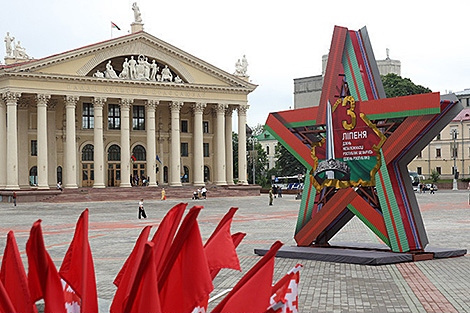
Allies and those responsible for the genocide
It is important that representatives of all the USSR republics took part in Belarus’ liberation back in 1944. “Everyone knew that the fate of their hometown area, the fate of their relatives and loved ones was decided here, at this frontier even though they were thousands of kilometers away from this Belarusian frontline. Every Soviet soldier waged a holy war for the future of the huge country that stretched from Brest to Vladivostok and from Murmansk to Tashkent. They waged it here, in Belarus,” Aleksandr Lukashenko said.
Belarus remembers names of those heroes. They are immortalized in names of Belarusian streets. Belarus also remembers the contribution of the countries that made up the anti-Hitler Coalition to the Great Victory. “It’s a pity that this coalition no longer exists. And it’s a shame that the new Western European elites are repeating mistakes of their predecessors,” the Belarusian leader remarked.
Aleksandr Lukashenko recalled that virtually all the European countries went to war against the Soviet Union under Nazi banners initially. And these Nazis and fanatics were backed by the elites - politicians and businesses who threw their support behind the Nazi Germany. “Everyone - from Wehrmacht soldiers to producers of chocolate, clothing, weapons and equipment for the German army - is responsible for the genocide of the Soviet people, including Belarusian people. It was they who, during more than three years of occupation, turned Belarus into a scorched earth. And today their descendants, instead of repenting and atoning for the sins of their grandparents, stifle us with sanctions and threaten us with weapons,” he said.
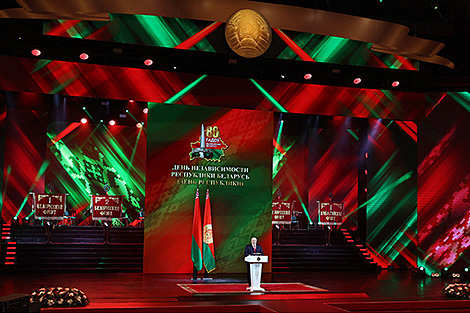
Unfortunately, the West has learned nothing from history and people in the West once again think that they can cultivate Nazism somewhere far from their own home and keep this monster on a short leash. While the world is once again teetering on the brink of another global catastrophe.
“But neo-Nazis will have to listen again and again to the terrible details of the crimes of their ancestors. Listen over and over again. The Great Patriotic War is a pinnacle of a thousand-year-long history of wars and battles of the western civilization and the eastern one. We have already closed the chapter on this history once. We will close it again if we have to,” he said.
At the same time Aleksandr Lukashenko is convinced that nothing and no one will force Belarus to steer away from the road towards peace and creation.
The price of international legitimacy
The 80th anniversary of the Great Victory will be celebrated in 2025. Belarus will also mark an anniversary of another milestone in the nation’s development – the Byelorussian Soviet Socialist Republic signed the Charter of the United Nations Organization in 1945. “We joined ranks of the founder countries as a country that had suffered the hardest blow, that had suffered tremendous losses, and had mounted unprecedented nationwide resistance against the aggressor,” Aleksandr Lukashenko said.
“It is bitter and painful to know that international legitimacy cost us terrible human losses. This is how things were back then. It is a law of life,” he continued. “Just as man comes into the world through pain, nations are born in terrible agony. They mature and grow stronger as they fight for their life, for their freedom, and for their historical memory.” According to Aleksandr Lukashenko, Belarus has learned this law, this is why Belarusians have been doing and keep doing everything not to stray from the path chosen by previous generations.
Ambitious plans and the key priority
The Belarusian nation had enough wisdom, strength, and character to preserve the nation’s legacy, traditions, values, and historical memory,” the president stressed.
“This is why we live in peace. And we have ambitious plans concerning this life. Our goals are cutting-edge technologies, jobs for people, sales abroad (we export half of what we make), and investments. These are the foundations of national security of any state,” Aleksandr Lukashenko said. “People are our priority. We will continue doing everything to improve conditions for starting a family and for bearing kids in every part of the country as well as conditions for work and rest, for achieving coveted heights in science, art, culture, and sport.”
Success in all directions depends on Belarusians themselves, Aleksandr Lukashenko is convinced. If one concentrates on goals and capabilities, then he or she will have everything: technologies, cutting-edge manufacturing enterprises, and space exploration.
Aleksandr Lukashenko stressed that the pressure of Western sanctions had not become a stumbling block for the country’s development, including thanks to cooperation and joint projects with allies like Russia and China. “We have managed to create an economy with a durability margin that makes it complicated to manipulate us,” the head of state stressed. “The West is not the only vendor. We have friends in other parts of the world, too. In five years we and Russians will be able to make everything the life and prosperity of our states require.”
The foreign policy vector
“Our foreign policy vector is not a turn, not a U-turn as experts and some politicians like to reflect on. It is a persistent choice of civilizations made by our ancestors and made by us,” the head of state stated.
He mentioned Belarus’ active work in integration structures in the post-Soviet space as well as interaction with major international associations, which are becoming increasingly powerful – the Shanghai Cooperation Organization and BRICS. Belarus has already become a full member of the “Shanghai family”. Belarus has filed an official application for joining the BRICS format as a participant. The country is also busy advancing cooperation in various fields with countries in Africa, Asia, and Latin America.
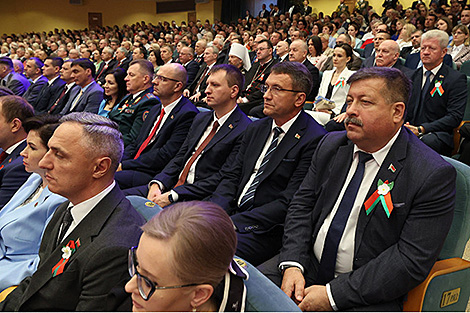
Nevertheless, the country is still ready to start a constructive dialogue with neighbors in the west. “Our terms are simple: respect Belarus’ sovereignty, national traditions, our historical memory, and the choice of the Belarusian nation,” he said.
The president stressed that the policy of sanctions-fueled pressure makes Belarus only stronger. There are a large number of countries that are ready not only to work with Belarus but also promote partnerships, friendly relations, allied relations, and mutually beneficial relations based on trust in Belarus as a partner, based on respect for Belarus’ persistent stance, on recognition of the quality of everything made in Belarus.
The situation at the Belarusian-Ukrainian border, red lines, and “night blindness”
The situation at the Belarusian-Ukrainian border is a hot-button topic of late. However, Aleksandr Lukashenko is not inclined to dramatize the situation: “Frankly speaking, nothing special [is going on]. Our neighbors took very active actions in the last few days. Possibly a couple of weeks. Very active. And our military personnel, particularly the border service noticed it right away. They delivered reports: as a matter of principle, it had been expected.”
The president did not rule out that the concentration of Ukrainian troops at the border may be related to the arrival in Belarus of a large number of military personnel from friendly countries, including from Russia, for the sake of participation in celebrations on the occasion of the 80th anniversary of Belarus’ liberation.
“But in no way should we allow any escalation or any aggravation. I want the Ukrainian leadership to hear me. The concentration of troops albeit insignificant ones is very dangerous during combat operations. We’ve analyzed the situation. We understand perfectly well that we need no aggravation. We’ve always said it. Ukrainians understand that we will retaliate,” the head of state said.
He cited excerpts from Russian mass media, which say that the Belarusian president suffers from “positive color blindness”. They say that Aleksandr Lukashenko will not draw any red lines and Belarus’ response to an aggression will be terrible. “If someone crosses the Ukrainian border, I will not have simply good color blindness. I may start suffering from night blindness. This is why the response will be truly harsh and sudden,” the Belarusian leader stated.
The president also noted that Belarusian units counteract attempts of the Ukrainian side to transport explosives via Belarus for the sake of consequent terrorist attacks in Russia. Belarusian units also see “movements” of the so-called Russian and Belarusian volunteer corps, which fight on Ukraine’s side.
“I would like to ask Ukrainians not to play with fire. It is very dangerous,” Aleksandr Lukashenko stressed.
According to Aleksandr Lukashenko, the Belarusian border service has been switched to enhanced security mode. Units of the special operations forces and other reconnaissance units have been deployed. The Belarusian army now covers probable axes of advance of the enemy. Apart from that, Air Force units and air defense units of both Belarus and Russia are on high alert. Missile systems Polonez and Iskander have been deployed.
“No red lines. A strike with all kinds of weapons against predetermined targets,” the Belarusian leader warned opponents in no uncertain terms.
At the same time Aleksandr Lukashenko encouraged the nation not to worry excessively. “I’d like to ask you not to worry. Remember what I’ve always told you: everyone should just do their jobs. I guarantee that we will not allow any clashes at the border with Ukraine. They won’t happen,” he said.
The president stressed that neither Belarus nor Ukraine wants combat operations since the battlefield situation is getting worse and worse for Ukraine. NATO led by the USA does not want to end the war in Ukraine and wants Belarus to get involved in combat operations.
“Americans and the West do not intend to withdraw from Ukraine. It is an excellent staging point, good lands. They have already been pawned and sold. Who will leave Ukraine? But Ukraine has no fighters left. This is why a serious escalation is needed in order to deploy NATO units over there. Mercenaries cannot handle Russians. This is the danger of the situation. And we know where they will come from,” Aleksandr Lukashenko stated.
The president did not rule out that movements and “mouse hunting” on the part of Ukrainians at the Belarusian border may be an attempt to cover the main thrust from another direction. “But we have taken all the precautions,” the head of state said. “We set up defenses at the southern border and the western one in order to prevent any mishaps like those, which have already happened in our history. If we and our Russian allies respond together to such things, trust me, we will be able to preserve peace and calm in our Belarusian land. I am not trying to inflate tensions. The tensions are already as high as they can be.”
Belarus’ stance on the migrant crisis
Aleksandr Lukashenko explained he had mentioned the migration problem in his speech because it is used to pressure Belarus in the West. Particularly Belarus’ closest neighbors, Poland’s leadership are hard at it. “They have already gone so far that… President Duda went to Xi Jinping and complained about Lukashenko. He asked Xi Jinping to influence Lukashenko and Putin so that they would end this migration,” the Belarusian leader remarked.
He once again reminded where from and why these people flee to the West. They are primarily residents of Afghanistan. Germany promised to shelter them back in the day. Besides, the military conflict in Ukraine also had an effect and made all the illegal migration flows converge in Belarus.
By the way, the attitude of “democratic” countries towards these people is worth mentioning: in the past Poland used water cannons against migrants in cold months of the year and beatings. Now these migrants get killed and their bodies are dumped at the Belarusian border. “We are already tired of showing all these facts. And where are European democracies? Where are Americans, who root for human rights?” the president asked rhetorical questions.
But the key thing is that in view of the pressure, sanctions, and terminated cooperation with Belarus in migration and border affairs the country has no intention to ensure security of aggressive neighbors to its own detriment. “I have no intention of ordering the border service, the army, and the rest, the civilians to defend the European Union at the border of Belarus and Poland. You’ve started choking us and force us to protect you from these poor people,” Aleksandr Lukashenko said.
POW swap with Ukraine and humane attitude
In conclusion Aleksandr Lukashenko made a few comments about another topic, which had unexpectedly stolen the spotlight. “Exchange of prisoners of war between Russia and Ukraine. Very recently. I wouldn’t even talk about it since it is a routine matter. It is determined by the Russian president. He told me about it. The work proceeds with difficulties but all kinds of things happen. People may be taken prisoner here and over there. Russians have way more prisoners. Ukraine has way fewer. I also know that. From sources in Ukraine,” the president noted.
Aleksandr Lukashenko noted that Belarus’ self-exiled opposition had recently noticed that Nikolai Shvets, who is accused of trying to blow up a Russian reconnaissance aircraft A-50 at the Belarusian airfield Machulishchi, had gone “missing”. The man turned up in Ukraine. It turned out he had been swapped for Metropolitan of Tulchyn and Bratslav Ionafan.
“No priests were involved in it. It was a request of the Russian president: help free the prominent priest Ionafan if you can. Ukrainians approached us with this request. I asked Putin what we should do. This is why we gave this man to Ukraine. They gave us the priest,” the president revealed the details.
In turn, the Ukrainian side suggested giving back three Russians with heavy injuries. “They transferred three more people. We took them outside Brest and handed them over to Russians outside Gomel,” Aleksandr Lukashenko said. “A prominent Ukrainian army officer nominated these people for the exchange because they would have died otherwise. This is how we’ve managed to save lives of three people. There is no doubt it is important.”
The president explained he had decided to talk about the matter now because the self-exiled opposition is trying to use the news against Belarus by describing it as a successful escape of the saboteur. “Nobody has escaped. It was a request of the Russian president, which we have fulfilled while saving particularly these three guys, who will live,” the head of state said.
Aleksandr Lukashenko’s words were met with applause and the president responded to it: “You see, you support such actions. I had absolutely no doubt about it. We are people and we should act like people do.”
“Don’t be surprised that extremely ill people (this is how they are described in mass media) will be released from prisons in several days. Those are people, who didn’t manage to flee and are in prisons. They were intent on destroying the country in 2020,” Aleksandr Lukashenko continued. “These are truly people with grave illnesses. Mostly with cancer. We approach everyone and treat everyone humanely. I believe that people in distress have no citizenship and we should help them. Because we are Slavs. We don’t want wars. We don’t want conflicts but if we get involved, we are forced to respond.”
HISTORIC DAY. How will Belarus contribute to the Shanghai Cooperation Organization’s work?
After taking part in Independence Day celebrations Aleksandr Lukashenko went to Kazakhstan on a working visit. Participants of the Shanghai Cooperation Organization summit gathered for an informal dinner in Astana in the evening on 3 July. It was a good opportunity to talk informally, compare notes about various matters in a relaxed setting.
The key event of the visit was the Shanghai Cooperation Organization summit, which took place in Kazakhstan’s capital city on 4 July in two formats at once: a session of the SCO heads of state council followed by an SCO+ meeting focusing on “Strengthening multilateral dialogue - the pursuit of sustainable peace and development.” The SCO+ meeting involved more national leaders and distinguished guests. The number included the UN secretary general and heads of a number of regional international organizations.
During the summit Belarus became the Shanghai Cooperation Organization’s tenth member state (in addition to India, Iran, Kazakhstan, China, Kyrgyzstan, Pakistan, Russia, Tajikistan, and Uzbekistan). By doing so, it replaced its observer status, which Belarus had had since 2015. Belarus embarked on the journey towards joining the Shanghai Cooperation Organization back in 2010 by becoming a dialogue partner.
Ahead of the visit to participate in the summit in Kazakhstan Aleksandr Lukashenko granted an interview to the news agency Kazinform. The head of state stressed that for Belarus the Shanghai Cooperation Organization is not just another international organization but a strategic perspective.
It is worth noting that decisions on granting Shanghai Cooperation Organization membership were signed after sessions of the heads of state council in the past. The procedure was adjusted in Belarus’ case. The document was submitted for signing at the beginning of the session. This is how the Belarus president participated in the summit from the start to the end as a leader of the SCO member state.
Aleksandr Lukashenko called it impactful and symbolic that Belarus joined the SCO in the year when it marks the 80th anniversary of liberation from Nazi invaders. “It is an excellent gift to the Belarusian people,” the head of state stated.
“Belarus is very proud of becoming a full member of the Shanghai Cooperation Organization. And we will bolster the Shanghai spirit of the organization based on principles of mutual respect, equality, and solidarity,” the Belarusian leader assured. “Here people listen to and hear each other, no one dictates their will, although global movers and shakers are part of the organization.”
In 2023 Shanghai Cooperation Organization countries accounted for 70.4% of Belarus’ total trade turnover. In January-April the figure stood at 71.4%. The Shanghai Cooperation Organization countries account for about 40% of the planet’s population and about a third of the world economic potential. It is remarkable that Belarus is the first SCO country that is located only in Europe and has no territories in Asia. It is also an indicator of the expansion of the global influence and the growth of the organization’s appeal.
Aleksandr Lukashenko assured that as a European country Belarus will do everything to make the Shanghai Cooperation Organization a global organization. “Have absolutely no doubt that Minsk will occupy a worthy place among the capital cities, which are represented here. We have something to offer in concrete cooperation avenues. We have nearly ten years of observer state experience in the Shanghai Cooperation Organization, stable political contacts and economic ties with all the members of the Shanghai Cooperation Organization,” the president stated.
At the summit he talked about the concrete areas, to which Belarus intends to pay more attention as a full member. The Belarusian leader believes that unity and cohesion of the partners will be the best response to challenges in global politics. This approach requires consolidation in the Shanghai Cooperation Organization space and creating Greater Eurasia.
The head of state encouraged the partners to take an active part in the development and reconciliation of the Eurasian Charter for Diversity and Multipolarity in the 21st Century. This idea was born as a result of the international conference that took place in Minsk in October 2023. The head of state also stressed the importance of interlinking various integration processes, stepping up cooperation in finance, in digital technologies, and a number of other fields.
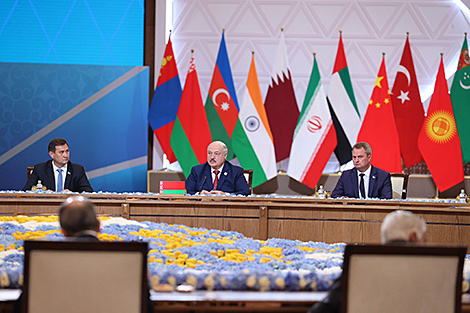
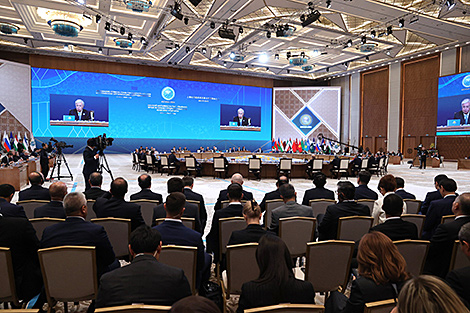
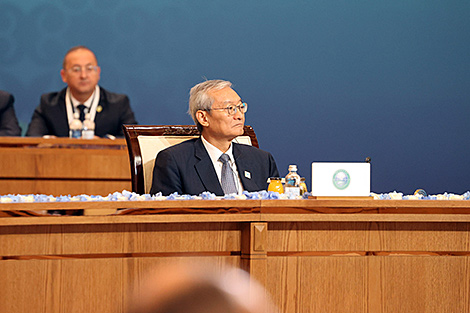
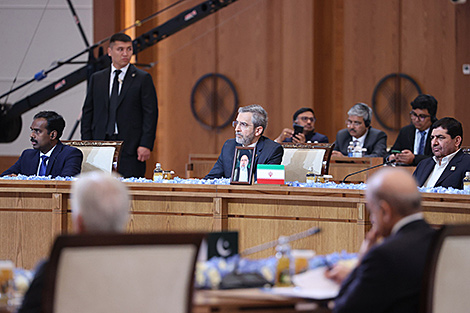
As a result of the session the heads of state passed the Astana declaration and about 20 decisions on promoting cooperation in various fields as well as decisions concerning matters directly relating to the organization’s operation. Among other things they appointed the Shanghai Cooperation Organization’s new secretary general. Kazakhstan’s Nurlan Yermekbayev will do the job in 2025-2027. He knows Belarus well. China will take over the presidency over the organization from Kazakhstan. Another top-level summit will take place in China in a year.
Belarus’ priorities in the Shanghai Cooperation Organization
International security, economic cooperation, food security, international positioning of the Shanghai Cooperation Organization, and mutual enrichment of cultures are the areas Aleksandr Lukashenko drew attention to in his speech at the Heads of State Council session.
“We are deeply convinced that in the 21st century it is imperative to build genuine and indivisible global security. That said, countries of the global majority should take the lead, since the self-obsessed and self-centered West has turned out to be incapable of it. Today there are no leaders over there, who are capable of making important decisions on their own,” Aleksandr Lukashenko stated.
The head of state stated that today partners within the framework of the Shanghai Cooperation Organization already have mutually beneficial projects in power engineering, transportation, logistics, finance, and manufacturing cooperation. “If we develop clear-cut rules on our platform, everyone will benefit from it, including those outside the SCO region of responsibility,” the Belarusian leader is convinced.
Speaking about food security, Aleksandr Lukashenko remarked that challenges in this area originate not only from traditional factors such as climate change, natural disasters, but also artificial barriers, including illegal sanctions against mineral fertilizers, machines, vehicles, and equipment, crop protection agents, and delivery routes. As a result, people in developing countries, including the poorest states of Asia, Africa, and Latin America, are forced to starve.
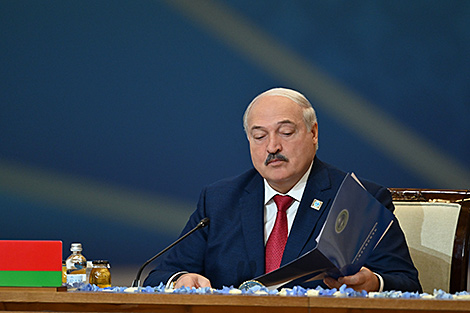
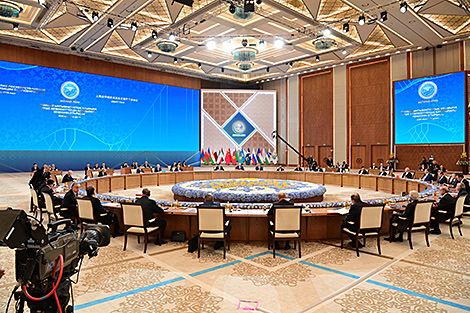
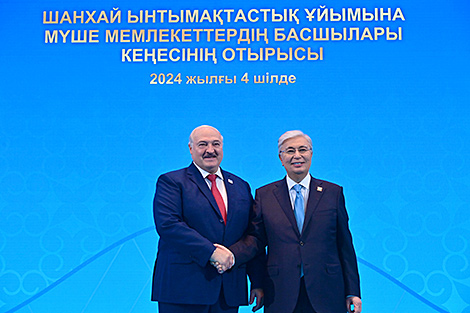
“We have the power to demolish the walls of the unipolar world, feed people, and eliminate multiple contradictions and conflicts stemming from social inequality, shortages of food and resources,” the head of state stressed.
Aleksandr Lukashenko assured that Belarus will do everything in its power, will make every effort to ensure that the Shanghai Cooperation Organization gains more weight and the number of its allies and supporters expands. By the way, many Belarusian ideas have already received international support. Those are ideas concerning technology transfer, information security, transport and logistics, manufacturing sector, trade and investments.
At the same time the Shanghai Cooperation Organization is more than security, economy and trade. “It is also a platform for mutual enrichment of cultures, which will certainly bring our peoples closer,” the Belarusian leader is convinced.
The deepest world crisis
During the SCO+ meeting Aleksandr Lukashenko quoted his Chinese counterpart Xi Jinping. The quote aptly reflects the essence of modern processes: “We have not seen such changes in a hundred years, and we are spearheading them together.”
According to the Belarusian leader, these changes stem from the rise of a global multipolar system of international security and cooperation. “However, the ‘golden billion’ is not happy about it. The West has built its wealth and established its political, economic and military superiority by colonizing and mercilessly exploiting all other countries for centuries,” the head of state noted. “The Washington-London hegemon is looking at the world as its property. It views the global population not as humans, but as an instrument for achieving its prosperity. This is the bottom line of political economy. This is the main source of numerous international security challenges.”
“This philosophy underpins the conflict in Ukraine. We know why it is still going on. As a result, the world today is in a most profound crisis,” said Aleksandr Lukashenko.
Steps towards building Greater Eurasia
“I am deeply convinced that our unity and cohesion will be the best response to challenges in global politics. With this in mind we must join forces in the organization’s area of responsibility. This approach requires creating Greater Eurasia,” the Belarusian leader said. He outlined several steps in this direction.
The head of state suggested working out the concept, which title and which draft are already available: the Eurasian Charter for Diversity and Multipolarity in the 21st Century. This idea was born as a result of the international conference that took place in Minsk in October 2023. This conference has already become an annual event focusing on regional security. “Moreover, we see it as kind of a Eurasian alternative to the transatlantic Munich Conference,” the president noted.
He expects representatives of Shanghai Cooperation Organization countries and other countries to participate in discussions about the charter in Minsk in autumn. “We believe it should be passed at the level of heads of state,” Aleksandr Lukashenko added.
The president also talked about aligning integration processes with each other: the Union State of Belarus and Russia, the Eurasian Economic Union, the Collective Security Treaty Organization, the Commonwealth of Independent States, ASEAN, the Organization of Islamic Cooperation, the Arab League, China’s Belt and Road initiative, and Russia’s Northern Sea Route project. “It is necessary to find points of convergence of all these processes and reconcile interests of all players,” he said.
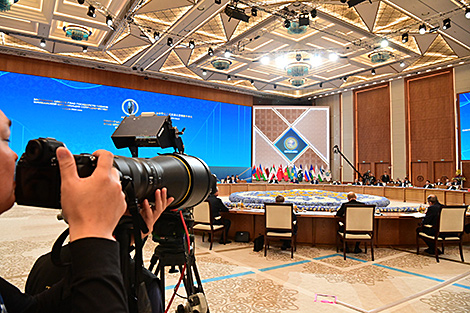
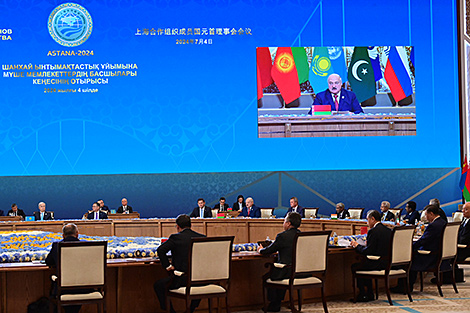
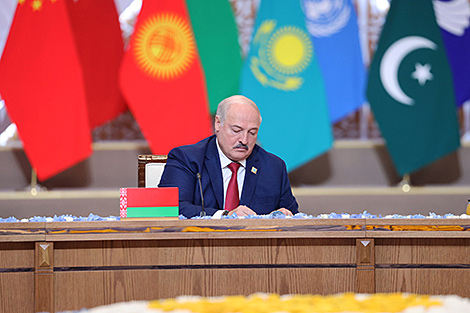
On the whole, Aleksandr Lukashenko encouraged everyone to act fast since time is of the essence. “Today people in the world are confused and in the dark. The UN secretary-general has just said that the world should brace itself for more conflicts. People need some direction and certainty. The SCO can provide it. But it should be done quickly because time is not on our side. If we do this, we will be ahead of the curve and the entire global community will thank us,” the Belarusian leader remarked.
Aleksandr Lukashenko suggested stepping up practical interaction across the entire complex agenda of the Shanghai Cooperation Organization. He suggested starting with finance. “As a priority matter Belarus sees the creation of a mechanism for bilateral payments using national currencies and the creation of a collective financial institution of the Shanghai Cooperation Organization,” he stated. “Only our organization has two most powerful countries in its ranks – China and the Russian Federation. And we are still in awe of the U.S. dollar. Well, let’s finally take certain steps in order to reduce dependence on the dollar. And you will see that those who have weaponized this currency will come to understand that things can no longer go on like this. We see all of it but we don’t take action. While people are waiting,” the Belarusian leader noted.
Aleksandr Lukashenko also drew attention to the importance of making digital technologies, which are becoming part and parcel of people’s lives, available to all countries: “Those digital technologies that benefit people and the economy. But not the artificial intelligence that we are anxiously awaiting. Everyone should be able to benefit from technological progress, not just Western countries and transnational corporations.”
The president assured that Belarus is ready to make whatever contribution it can to the common efforts of the SCO member countries in such areas as industry, trade, science, culture, and education. The same applies to food security and agriculture, which the president specifically focused on. The president believes it would be a great idea to set up an AgroSCO exposition within the framework of Belarus’ largest agricultural expo Belagro.
“The tip of the iceberg” of Aleksandr Lukashenko’s contacts on the sidelines of the summit
On the sidelines of the summit the president held negotiations with the China president, the Türkiye president, the prime minister of Pakistan, and the secretary general of the United Nations Organization. On the whole, he had multiple various international contacts. For instance, Aleksandr Lukashenko and the Russian leader Vladimir Putin discussed various matters at length and repeatedly at an informal dinner the day before and on the main day of the summit.
“The president had a very busy agenda. The negotiations covered by mass media are only the tip of the iceberg of contacts the head of state had these days. A lot of unofficial events happened. He met on the move with heads of virtually all delegations,” Belarusian Minister of Foreign Affairs Maksim Ryzhenkov shared the details.
It allowed discussing matters concerning the development of bilateral relations with many heads of state and finding solutions for some problems.
For instance, during the meeting with Pakistan Prime Minister Shehbaz Sharif the parties sketched out an action plan for the next few months. It is supposed to end with a top-level meeting and the signing of a roadmap meant to guide bilateral cooperation. It will be preceded by contacts at the level of the prime ministers, ministers, and members of the intergovernmental commission.
“We may be past the period when we were closely studying each other trying to figure out in what areas we could cooperate. It’s time for us to move on to establishing the closest ties between our countries,” Aleksandr Lukashenko stressed during the meeting.
The same applies to negotiations with Türkiye President Recep Tayyip Erdogan and to cooperation with that country as a whole. Agreements are in place on a number of contacts at the level of the Ministry of Foreign Affairs National Bank the Finance Ministry. “Visits to Belarus. For the sake of realizing the projects that are supposed to advance our trade turnover to an even higher level,” the Belarusian minister of foreign affairs said.
The meeting with China President Xi Jinping was quite productive. The leaders discussed the most serious matters. The ministers of foreign affairs and the heads of the two governments will take it from here. Important visits are expected among other things.
“We will definitely facilitate further stable development of our relations,” Xi Jinping stated. The Chinese leader added that the parties intend to go forward in this direction by leaps and bounds.
“I am very glad that you are about to become the presiding country [in 2025]. It means I will have an extra opportunity to visit the People’s Republic of China next year. I’ve noted down your initiatives that you promote in the Shanghai Cooperation Organization: global security, global development, global civilization, global control of artificial intelligence. You’ve already noticed positive and negative aspects of artificial intelligence. We support all your initiatives by all means. Particularly the key initiative to resolve the Ukrainian crisis. This initiative is consonant with Brazil’s initiative,” the president noted.
After completing the main bilateral meeting involving their delegations, the leaders of Belarus and China returned to the SCO+ summit. After that they resumed one-on-one negotiations. Aleksandr Lukashenko and Xi Jinping talked at length. The Chinese minister of foreign affairs joined the conversation when necessary.
Aleksandr Lukashenko also met with UN Secretary General Antonio Guterres. Maksim Ryzhenkov was asked to reveal the details. “Virtually the entire meeting was dedicated to the UN work in the Republic of Belarus, to the beginning of a new cycle of interaction,” the minister of foreign affairs said. “Antonio Guterres expanded on the fact that the Republic of Belarus is a very reliable partner for realizing all the goals and tasks the United Nations Organization intends to achieve. After that they talked a lot about the Sustainable Development Goals. The secretary general repeated several times that he likes how these goals are being accomplished in our country across the board. It was said that there are no complaints about Belarus.”
The minister stressed that the United Nations Organization has no special case focusing on Belarus and allowing anyone to make complaints about the country. Some issues were raised only in passing and exclusively as pieces of advice.
HOLD ON TO THE POSITIONS. What does Aleksandr Lukashenko expect from the new ambassador to Russia?
Despite massive festive events inside the country and participation in the Shanghai Cooperation Organization summit in Astana Aleksandr Lukashenko found some time to pay attention to routine matters. Truth be told, there were priority ones as well. On 2 July the president received a report from Head of the Belarus President Administration Dmitry Krutoi and Ambassador Extraordinary and Plenipotentiary of Belarus to Russia Aleksandr Rogozhnik.
BelTA reported earlier that on 27 June Aleksandr Lukashenko reshuffled some personnel. Dmitry Krutoi was appointed Head of the Belarus President Administration. His previous role as Belarus’ ambassador to Russia was taken over by the former Industry Minister Aleksandr Rogozhnik. The head of state explained his personnel decision by the fact that Belarus’ cooperation with Russia is dominated by manufacturing industry projects. Aleksandr Lukashenko emphasized that Dmitry Krutoi remains responsible for the implementation of agreements with the Russian Federation.
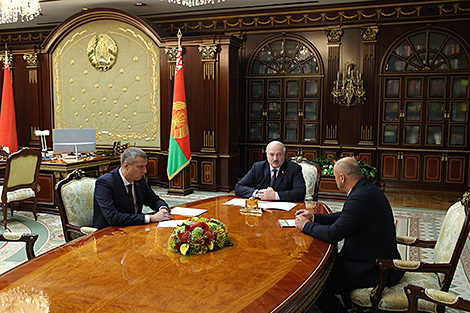
“Aleksandr Nikolayevich [Rogozhnik], I think we will meet with you more than once in order to discuss specific aspects of your work as the ambassador to the Russian Federation. It will be easier for you in the sense that you will take over from Dmitry [Krutoi] who has done his job pretty well as the ambassador and who has come to grips with the things that need to be given special attention to. I really hope that we will make progress in our cooperation, mostly in the industrial sector. I want to see meaningful results here,” the president said as he set the task.
At the same time, the head of state noted that the situation on the Russian market is not easy in view of tough competition. “It is unavoidable. This has always been so and there is no escaping it in the future. Yet, we cannot lose our positions on the Russian market. This is a number one task for you,” Aleksandr Lukashenko emphasized.
To do this, it is necessary to set up and expand Belarus’ multibrand and service centers and trading houses in Russia. He drew special attention to the use of Russian loans to implement joint projects in manufacturing sector.
According to the president, interaction with Russian regions is equally important. “It is necessary to continue active communication with regional authorities,” the head of state instructed.
Aleksandr Lukashenko also reminded about promising areas of cooperation such as aircraft manufacturing, nuclear energy, and space exploration.
“We are considering the construction of a second nuclear power plant. Having electric energy will never hurt. There will never be a surplus of it in the country,” said Aleksandr Lukashenko. “We build houses that use electricity for heating purposes. And we focus heavily on electric vehicles. We don’t just have R&D. Our manufacturers operate at full capacity especially when it comes to buses and trolleybuses. Electricity is needed everywhere. Therefore, we need to anticipate demand.”
“There are a lot of specific programs. As an ambassador your status is equal to that of a deputy prime minister. The ambassador’s status was upgraded to the level of deputy prime minister so that you can meet with almost any government official, any civil servant,” added Aleksandr Lukashenko.
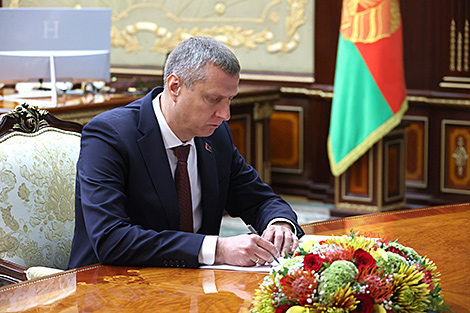
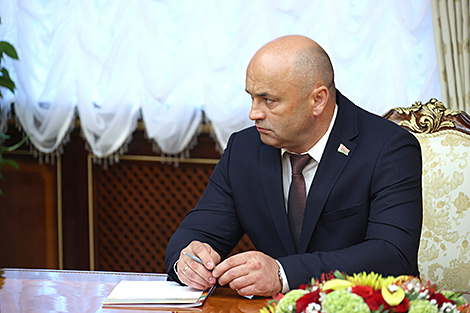
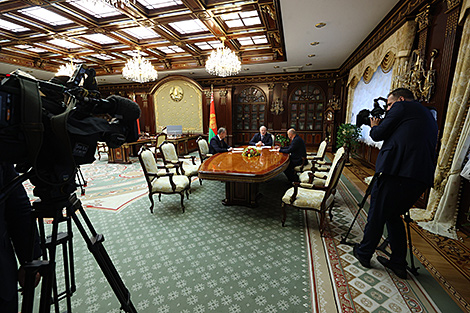
KUPALA NIGHT. What lucky fern flower was found in Belarus?
Participation in the national festival Kupala Night (Alexandria Gathers Friends) in Aleksandr Lukashenko’s hometown area was the final part of the president’s work week. This cultural forum has turned 15 this year. As the president said, the event has turned from a small cozy gathering into an international event.
“Both Alexandria Gathers Friends and the festival in Vitebsk ceased to be solely Slavic a long time ago. Representatives of more than ten countries have come here. More than 30 countries will be featured at Slavianski Bazaar. This confirms my thesis that this is no longer a Slavic bazaar. But it all started from here all the same,” the president said.
Nevertheless, the festival in Alexandria has not lost its coziness and special atmosphere. It allows one to feel the continuity of times in full. The festival has become a place of attraction for creative people and true fans of the original Slavic culture from all over Belarus and from other countries.
“The key thing that we have done was to revive traditions of our ancestors. We develop the original national culture. You will agree that it is not enough to know and remember these traditions. They should become part of modern history,” Aleksandr Lukashenko believes. “This is the only way to preserve your identity – by continuing the thousand-year history of the East Slavic peoples. Knowing this history, understanding the philosophy of our native culture is our national treasure. We must preserve it if we want to be a people, if we want to be a nation. This is the cornerstone of the Belarusian statehood.”
The president is convinced that there is no better protection than love for the native land and belief in its power. “We pass on this tradition to our children, generously share it with friends. We have found what our ancestors have been looking for for a thousand years. We have learned the true meaning of life. Our peacefulness, desire for friendship, respect for the traditions of different cultures are the very fern flower with secrets of the world embedded in it. Secrets of the world and of peace,” Aleksandr Lukashenko stressed.
At the festival Aleksandr Lukashenko also shared his work schedule for the near future. After participating in the Shanghai Cooperation Organization summit in Astana he came to his hometown area right away not only to attend the opening ceremony of the festival but also for the sake of convenience of working in the country’s east afterwards. The active phase of the harvesting campaign is about to begin. The head of state wants to check on how things are organized on the ground. “Crops in the field have never been that good. I cannot recall another year that has been as good for farmers as this one. We have been blessed with a wonderful harvest this year so far. It will be hard work. And I need to see how people here, in eastern regions can handle it,” he noted.
Aleksandr Lukashenko remarked it is also important for him to visit the area where he grew up in order to recharge his batteries: “After all the workload when you return to your native land, it feels like another world. You come to your roots. Here you feel better, easier. And literally in a day you become healthy and strong like before. Like in the days when you walked this earth. You recharge very quickly.”
When in his hometown area, the president admitted that it is still important for him to justify people’s trust and the feeling is particularly strong when he talks to locals. “God forbid if you fail the trust of the people, who have given you everything you wanted. It is the most difficult thing for a person,” the head of state said. “It may seem that one should grow some thick skin and calm down after three decades. But nothing of the kind. All of it comes from here, from this land. Here you learn to appreciate people, to make them happy, to do everything so that they do not think badly of you.”
Once again the president encouraged everyone, particularly urban dwellers, to think about buying a land plot in a village in order to give themselves and their kids an opportunity to visit the countryside all the time and revive these most beautiful corners of Belarus. “You know our countryside has been saved. We are building over 1,500 agrotowns. We have already determined where they will be. We have medium-sized and totally tiny villages left where a great number of people used to live,” Aleksandr Lukashenko said. “Those are beautiful places. Simply wondrous. These medium-sized and tiny villages should not die out. And who will restore them? Who will preserve them? You and I!”
“You should revive these little villages. Feel free to build a summer house over there. After all, 4,000-5,000m2 of land is quite a lot. You can get only 600m2 in a city or outside a city for this summer house. But here you can get so much more. Do it now. It will be too late tomorrow. Do it because you have kids and they should walk barefoot on soil,” Aleksandr Lukashenko said.







 print version
print version make home page
make home page add to bookmarks
add to bookmarks

